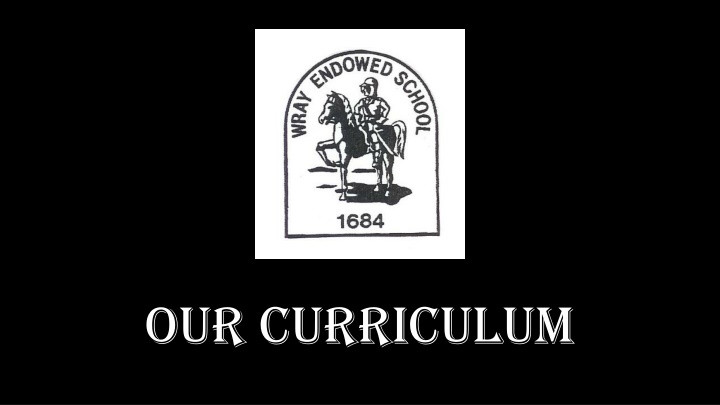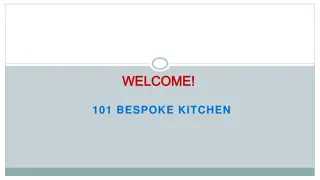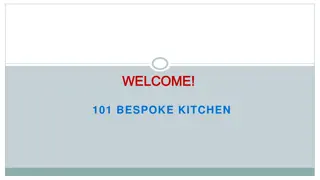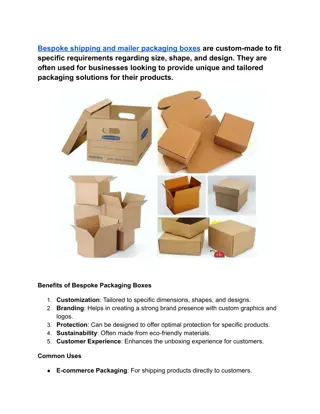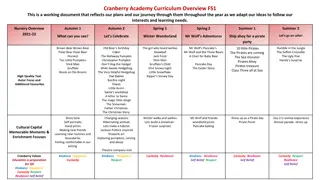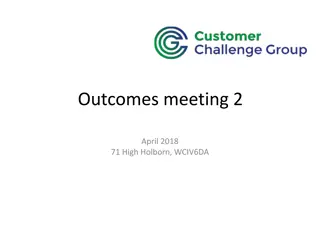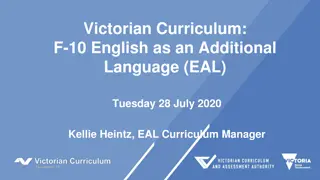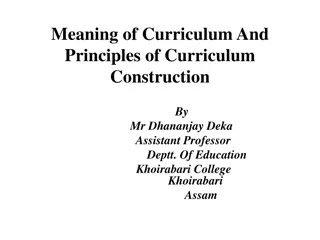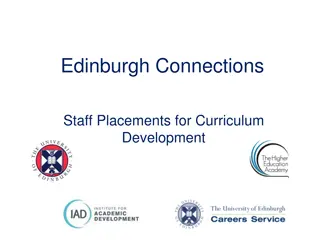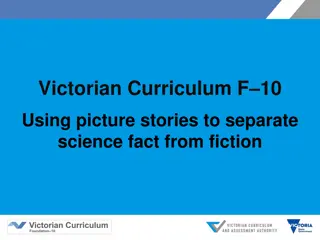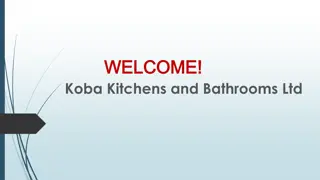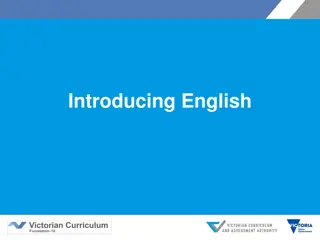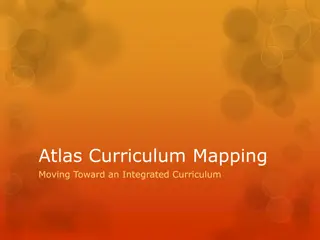Bespoke Curriculum Development for a Dynamic Learning Environment
Our school has crafted a unique curriculum that prioritizes the diverse needs of our community members. Through thematic approaches, staff collaboration, learner feedback, and community engagement, we ensure a stimulating and comprehensive learning experience for all students. By integrating various subjects, focusing on progression, and fostering a sense of unity, our curriculum promotes creativity, critical thinking, and holistic development. The inclusive structure also accommodates mixed-age classes seamlessly, allowing for tailored instruction and collaborative learning opportunities.
Download Presentation

Please find below an Image/Link to download the presentation.
The content on the website is provided AS IS for your information and personal use only. It may not be sold, licensed, or shared on other websites without obtaining consent from the author.If you encounter any issues during the download, it is possible that the publisher has removed the file from their server.
You are allowed to download the files provided on this website for personal or commercial use, subject to the condition that they are used lawfully. All files are the property of their respective owners.
The content on the website is provided AS IS for your information and personal use only. It may not be sold, licensed, or shared on other websites without obtaining consent from the author.
E N D
Presentation Transcript
We have developed a bespoke curriculum that ensures that all members of our school community Feel valued, challenged and encouraged Regular staff meetings to review and shape the curriculum Subject leaders work with the Curriculum Lead to create an action plan for their subject and share this with all staff Regular and up to date training for subject leaders with the opportunity to feed back to staff Knowledge and skills documents for all subjects created for each class to show the progression for the year groups within each class and from EYFS to Year6 Pupil voice at the beginning, throughout and at the end of each theme Regular communication with our families
How is our curriculum bespoke to us? A thematic approach three themes are chosen for the year by staff. We pay close attention to what is happening in the world/special events that are coming up Topics we ensure the themes cover the knowledge children need to learn in each year group in History and Geography Links we make links to the other subjects (Science, DT, Art, Computing, PE, Literacy) to ensure our curriculum is creative, broad and exciting Progression using our knowledge and skills documents, we ensure that knowledge is built on throughout the year and throughout a child s time with us Rolling programme (how does it work in mixed age/crossing Key Stages classes) regular reviews of what has been covered/what the children know and still need to know in an area when a child is in a particular class. Annotated/highlighted documents and topic webs/grids show us where to go next Local and wider community local walks out and about to trips further afield to enhance children s life experiences and knowledge of the world around them (building on the EYFS curriculum), inviting visitors in to school to give specialised talks and lessons, learning about our locality Working and learning together adults work in different classes, some teaching several subjects. Our whole school theme days bring us all together to share our knowledge and skills, we enjoy Science Week, Maths week and World Book Day And sometimes learning apart children work in smaller differentiated groups where required to ensure that every child is challenged, valued, encouraged and supported
Mixed Age Classes - how does the curriculum work? Class One: Reception/ Year 1/ Year 2 Following our bespoke Knowledge and Skills documents we plan exciting lessons under our thematic umbrella . and we teach a range of History/Geography/Art/DT and Computing linked to our theme throughout the term. Science and PE are taught weekly, linked to the termly theme if possible. RE, Music and PSHE are stand alone subjects. Maths and English are taught in Year groups using TAs to work with one year group. Children access Continuous Provision throughout the week with activities and challenges to support their development. Class Two: Year 3/ Year 4 Following our bespoke Knowledge and Skills documents we plan exciting lessons under our thematic umbrella . History and Geography are taught in Topic lessons with one subject area being covered each half term. This is the same for Art and DT. Science, Computing and PE are taught weekly, linked to the termly theme if possible. RE, Music, German and PSHE are stand alone subjects. By using an evolving rolling programme, we ensure that the knowledge and skills for years 3 and 4 have been covered by the time a child leaves Class 2. Maths and English are often taught in Year groups using TAs to work with one year group. Class Three: Year 5/Year 6 Following our bespoke Knowledge and Skills documents we plan exciting lessons under our thematic umbrella . History and Geography are taught in Topic lessons with one subject area being covered each half term. This is the same for Art and DT. Science, Computing and PE are taught weekly, linked to the termly theme if possible. RE, Music, German and PSHE are stand alone subjects. By using an evolving rolling programme, we ensure that the knowledge and skills for years 5 and 6 have been covered by the time a child leaves Class 3. Maths and English are often taught in Year groups using TAs to work with one year group.
The Early Years Curriculum When planning the curriculum for Reception children each term, we follow the statutory framework which is split into prime and specific areas. To support this, we also use Development Matters (non-statutory guidance). Following each termly theme, we plan exciting lessons and learning opportunities for the children ensuring that we follow their interests and that the Three and Four Year Olds / Children in Reception and Early Learning Goals are met. The early Years Curriculum is built on in each year group using our Knowledge and Skills documents. Subject leaders have a good knowledge of the EYFS Framework and how this links to their subject area so they can monmitor progression. Prime Areas: Communication and Language Listening, Attention and Understanding Speaking Specific Areas: Literacy Comprehension Word Reading Writing Past and Present People, Culture and Communities The Natural World Understanding the World Personal, Social and Emotional Development Self-regulation Managing Self Building Relationships Mathematics Number Numerical Patterns Expressive Arts and Design Creating with Materials Being Imaginative and Expressive Physical development Gross Motor Skills Fine Motor Skills We constantly reflect on the different rates at which children are developing an adjust our practice appropriately using Characteristics of Effective Learning: Playing and Exploring children investigate and experience things and have a go Active Learning children concentrate and keep on trying if they encounter difficulties, and enjoy achievements Creating and Thinking Critically children have and develop their own ideas, make links between ideas, and develop strategies for doing things Next steps are planned and brought into the areas of provision for children to build on their knowledge and practise skills.
Core Subjects English Maths Science Children are taught as a whole class, with differentiated activities being planned in for children to access independently or as part of a group. We ensure that a range of units are taught in each class to ensure progression and full coverage of the National Curriculum English Programme of Study. We link our writing units to the termly theme and plan for cross-curricular writing opportunities within Literacy lessons. Children have an weekly extended writing task for which they are sent Talk Homework to help generate ideas. Guided Reading takes place at least once a week with each year group working in a small group being taught new skills in reading. In Class 1, children have a daily Phonics session (using Letters and Sounds with Phonics Play) to focus on reading and writing and in Class 2 and Class 3, children are taught Spelling 4 days a week (using Purple Mash) with Year 2 being taught as a single year group and 3/4 and 5/6 being taught as lower and upper Keys Stage 2. Children in each class are taught handwriting as a separate lesson. In reception, this begins with a programme called Squiggle While you Wiggle focussing on fine and gross motor skills, moving on to Achieving Excellence in Handwriting which all staff have been trained to deliver. Classes are sometimes taught in year groups and sometimes as a whole class depending on the area being covered. Lessons are always differentiated and progression is planned for. We use White Rose Maths for guidance and as starting points to plan exciting lessons and to ensure full coverage of the National Curriculum Mathematics Programme of Study. We ensure that children are introduced to using concrete equipment and pictorial representations from joining us in Reception so that this can be built on and children become confident and independent problem solvers, responsible for choosing their own resources for Maths. We enjoy celebrating World Maths Week and bringing mathematics into other areas of the curriculum throughout the year, including our whole school theme days. We have a long term plan for Science to ensure full coverage of all units by the time children finish their primary education. In Class 1, children follow the Year 1 units each year. Reception children are included in whole class teaching but then explore a range of tasks in provision linked to the unit throughout the term. This ensures coverage of the Science aspects of Understanding the World and provides a good grounding for accessing the units again in Year 1. In Class 2 there is a 2 year rolling programme covering the required Year 2 and Year 3 units. In Class 3, there is a 3 year rolling programme covering the required Year 4, Year 5 and Year 6 units. We celebrate Science week each year and plan Science activities into our whole school theme days.
Foundation Subjects Geography Linked to the termly theme. Knowledge and Skills documents are followed and annotated to ensure full coverage. DT Linked to the termly theme. Knowledge and Skills documents are followed and annotated to ensure full coverage. Art Linked to the termly theme. Knowledge and Skills documents are followed and annotated to ensure full coverage. History Linked to the termly theme. Knowledge and Skills documents are followed and annotated to ensure full coverage. Computing Linked to the termly theme where appropriate. We follow the Purple Mash scheme of work. Knowledge and Skills documents are followed and annotated to ensure full coverage. PE Taught in Key Stage groups. Linked to the termly theme where appropriate. We follow the Purple Mash scheme of work. Knowledge and Skills documents are followed and annotated to ensure full coverage. MFL Taught as a stand alone subject in Class 2 and Class 3 Knowledge and Skills documents are followed and annotated to ensure full coverage. PSHE Taught as a stand alone subject. We follow Corum Life Education . Linked to the termly theme where appropriate. Knowledge and Skills documents are followed and annotated to ensure full coverage. Music Taught as a stand alone subject. We follow Charanga . Knowledge and Skills documents are followed and annotated to ensure full coverage. RE Taught as a stand alone subject. We follow the Lancashire syllabus SACRE . Knowledge and Skills documents are followed and annotated to ensure full coverage.
Enrichment what else do we do? Trips local and further afield linked to our themes and subject areas Visitors specialists in their field linked to curriculum areas/ fun days Theme Days in house teams once a half term. Linked to our termly theme or other areas of interest in the wider world Outdoor Learning at every opportunity Swimming weekly lessons for all KS2 children all through KS2 Forest School weekly sessions led by our fully trained teachers Philosophy for children linked to other curriculum areas Wellbeing weekly sessions giving time for children to reflect and tools to support their own wellbeing Class assemblies using Picture News /linked to our Value of the Term /to enhance other curriculum areas
